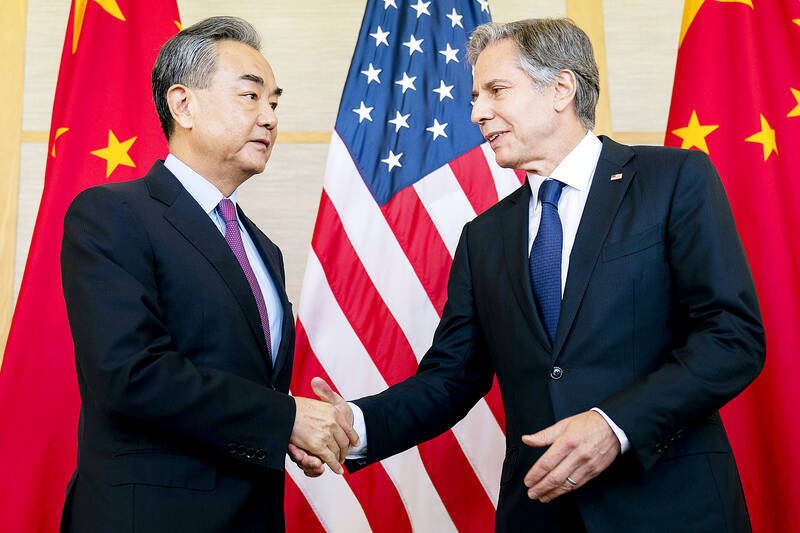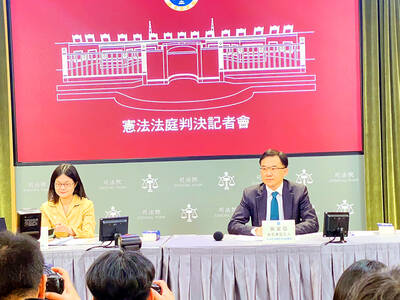US and Chinese officials were in Germany over the weekend looking to patch up a rift opened by the response to a Chinese balloon shot down over US territory, but a meeting between their top diplomats showed how difficult it might be to compromise.
US Secretary of State Antony Blinken and Chinese Central Foreign Affairs Commission Director Wang Yi (王毅) traded barbs on everything from the balloon and Taiwan to North Korea and Russia in their first meeting since the high-altitude craft traversed the US and provoked an acrimonious round of finger pointing.
Blinken also said China was weighing whether to give Russia weapons for its war in Ukraine, a move that would ratchet up tension even further.

Photo: AP
It all underscored how, for all the claims from US President Joe Biden and Chinese President Xi Jinping (習近平) about their desire to steady ties, neither side seems capable of doing so. The meeting was meant to pave the way for a visit by Blinken to Beijing — he canceled a visit once the balloon was spotted — but only seemed to make prospects more remote.
“The relationship is becoming more brittle,” said Kori Schake, director of foreign and defense policy studies at the American Enterprise Institute, who has previously worked in the US Department of State and at the Pentagon.
“If China mirrors to Russia the assistance the West is providing Ukraine, it will cement the Russo-Chinese alliance and also Western perceptions of China as a malevolent international force,” she said.
Leaders from places such as Brazil and Singapore have warned about the military and economic spillovers of a prolonged clash between the world’s two biggest economies — and expressed their unwillingness to choose between them.
The rocky meeting and sharp rhetoric around it demonstrated just how sour the US-China relationship is, and how both sides appear willing to squabble over petty issues. In its readout of the talks, China refused even to call it a meeting, referring to it as an “informal contact.”
Wang rejected what he called US “finger-pointing” regarding Russia, and said China would release a new peace proposal for Ukraine in the coming days that would be in keeping with previous efforts by Xi.
Wang, who was set to fly to Moscow for meetings with top Russian officials after his stay in Munich, also met Ukrainian Minister of Foreign Affairs Dmytro Kuleba, and condemned attacks on nuclear power stations.
What the world heard from Blinken about China’s role “underscores that we’re going to have to really up our diplomatic game,” Brookings Institution senior fellow Fiona Hill said in a US television interview. “A lot of other countries just don’t buy that there’s as big an issue as we see with Russia’s invasion of Ukraine.”
What is unclear is whether the squabble on the sidelines of the Munich Security Conference represented some healthy venting that they can now get past, or yet another signal that the US and China remain stuck in a cycle of recriminations that could push them closer to conflict.
There are areas where the two sides would benefit from cooperation, such as climate change and nuclear proliferation, observers have said.
In a readout from the meeting, US Department of State spokesman Ned Price said Blinken had condemned a new intercontinental ballistic missile launch by North Korea “and emphasized the need for responsible powers to respond to such significant international challenges” — a diplomatic request for China exert its influence and curb such launches.
“A meeting is always better than nothing,” said Henry Wang Huiyao (王輝耀), founder of the Center for China and Globalization. “Both sides appeared to be tough. They both have domestic audiences to cater to.”

The US government has signed defense cooperation agreements with Japan and the Philippines to boost the deterrence capabilities of countries in the first island chain, a report by the National Security Bureau (NSB) showed. The main countries on the first island chain include the two nations and Taiwan. The bureau is to present the report at a meeting of the legislature’s Foreign Affairs and National Defense Committee tomorrow. The US military has deployed Typhon missile systems to Japan’s Yamaguchi Prefecture and Zambales province in the Philippines during their joint military exercises. It has also installed NMESIS anti-ship systems in Japan’s Okinawa

TRAGEDY STRIKES TAIPEI: The suspect died after falling off a building after he threw smoke grenades into Taipei Main Station and went on a killing spree in Zhongshan A 27-year-old suspect allegedly threw smoke grenades in Taipei Main Station and then proceeded to Zhongshan MRT Station in a random killing spree that resulted in the death of the suspect and two other civilians, and seven injured, including one in critical condition, as of press time last night. The suspect, identified as a man surnamed Chang Wen (張文), allegedly began the attack at Taipei Main Station, the Taipei Fire Department said, adding that it received a report at 5:24pm that smoke grenades had been thrown in the station. One man in his 50s was rushed to hospital after a cardiac arrest

ON ALERT: Taiwan’s partners would issue warnings if China attempted to use Interpol to target Taiwanese, and the global body has mechanisms to prevent it, an official said China has stationed two to four people specializing in Taiwan affairs at its embassies in several democratic countries to monitor and harass Taiwanese, actions that the host nations would not tolerate, National Security Bureau (NSB) Director-General Tsai Ming-yen (蔡明彥) said yesterday. Tsai made the comments at a meeting of the legislature’s Foreign Affairs and National Defense Committee, which asked him and Minister of National Defense Wellington Koo (顧立雄) to report on potential conflicts in the Taiwan Strait and military preparedness. Democratic Progressive Party (DPP) Legislator Michelle Lin (林楚茵) expressed concern that Beijing has posted personnel from China’s Taiwan Affairs Office to its

‘ILLEGAL RULING’: The KMT and the TPP slammed the Constitutional Court judgement, saying it contravened the law and was trying to clear the way for a ‘green dictatorship’ The Constitutional Court yesterday ruled that amendments to the Constitutional Court Procedure Act (憲法訴訟法) passed by the Legislative Yuan last year are unconstitutional, as they contravene due legislative process and separation of powers. The Legislative Yuan on Dec. 20 last year passed amendments stipulating that no fewer than 10 grand justices must take part in deliberations of the Constitutional Court, and at least nine grand justices must agree to declare a law unconstitutional. The Executive Yuan on Jan. 2 requested that lawmakers reconsider the bill, but the Legislative Yuan, under a combined majority of Chinese Nationalist Party (KMT) and Taiwan People’s Party